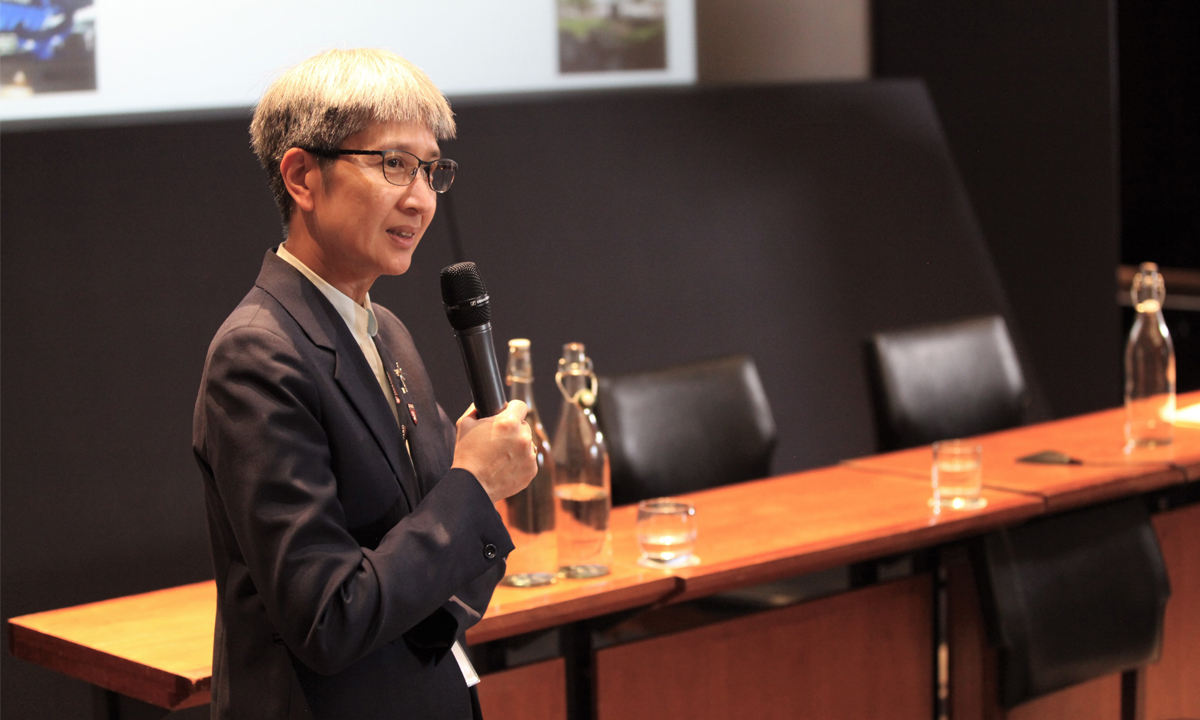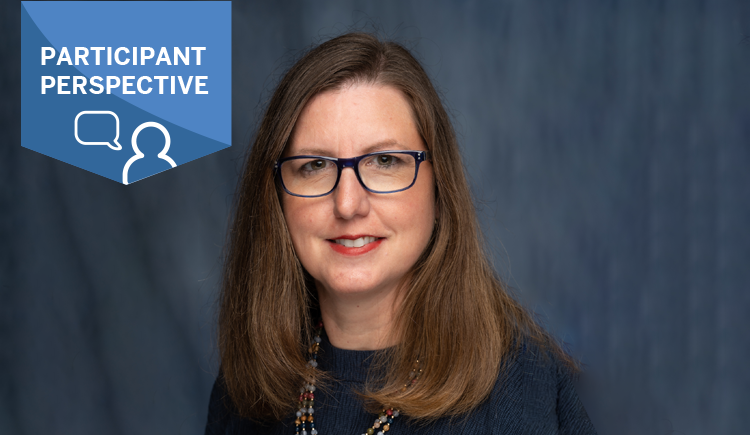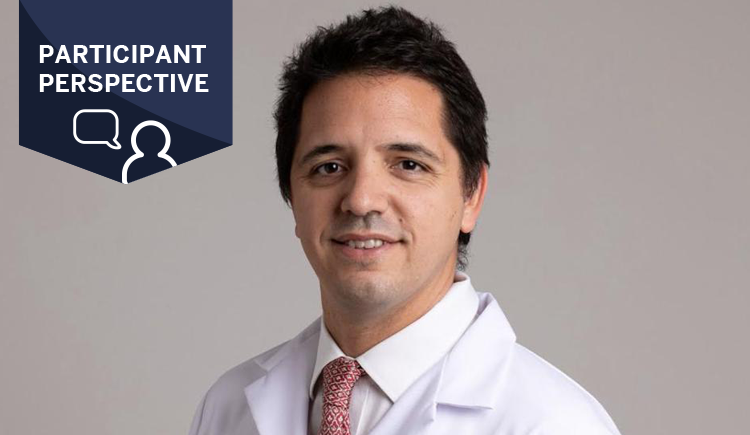
Fiona Myint, FRCS, MA (Clin Ed), LLM, SFHEA, has spent the past two decades as a vascular surgeon in London, and she believes that this was always meant to be her career—but it took her a while to figure it out.
Back when she was in medical school, she thought she wanted to be a rheumatologist and work with joints and soft tissue. “At that time, the field appealed to me because the immunology associated with it seemed new and exciting,” explains Myint.
“The first clinical attachment of my medical training was in rheumatology, which I enjoyed, but then the second clinical attachment was in orthopedics—joints, and bones—and I realized I liked this even better,” she recalls. What appealed to her the most was that while rheumatologists treat people’s symptoms, orthopedists perform surgery to actually fix problems. “We are actually taking out bad joints and putting in new ones,” she says, adding that she really liked the ability to get measurable results.
“I like to think that surgery found me,” she points out. “When I was in my 20’s and realized that I wanted to be a surgeon, I suddenly thought back to my childhood and remembered how much I had always liked fixing things. Suddenly, it made sense that this was what I was meant to do,” she recalls.
Focusing on the Vascular System
While training for general surgery, Myint was first introduced to vascular surgery, which is the branch of surgery that deals with the circulatory system that carries blood and lymph throughout the body, diseases of the vascular system, and the body's arteries. Vascular surgeons treat all veins within the body, except for the heart and the brain. She found herself intrigued with this focus.
“In the UK, the residency-equivalent is six years of training, and every year I did something that had a vascular component and I found it very interesting,” she says. “Since then, in the last eight years in the UK, vascular disease has split off into a separate specialty, and I decided to really focus on this area,” she adds.
Throughout her career to date, Myint has held a number of positions—each one providing much personal and professional satisfaction, she says. For instance, she was appointed as a consultant at the Royal Free Hospital in 2000, and also began working at the North Middlesex University Hospital and the Whittington Hospital, where she shared her expertise with her colleagues and patients. She is also an elected Member of Council of the Royal College of Surgeons of England and Chair of the Dental and Surgical Examinations Committee of the Royal College of Surgeons of England.
While she finds clinical work rewarding, she is also very enthusiastic about education and has a strong desire to pass on what she has learned to the next generation. This led her to pursue a Master’s in Clinical Education from The Institute of Education. She also became a Royal College surgical tutor, Training Program Director for both core surgery and higher surgery, and a member of the UK general surgery Specialty Advisory Committee. In addition, she currently sits on the UCL Medical School undergraduate teaching Committee and the Intercollegiate Committee for Basic Surgical Examinations and is an invited member of the Joint Committee for Intercollegiate Examinations.
“I also recently became program director for the Harvard Medical School Surgical Leadership Program, which provides an important opportunity to train other surgeons on business and leadership skills to help them elevate their effectiveness on the job and provide a forum for them to learn from each other,” she says.
The Importance of Reflection
Myint notes that educating a new crop of medical professionals brings her much satisfaction, but she points out that it isn’t only her successes that matter; she also enjoys directing students in a career they can feel passionate about. “About five percent of trainees will have difficulty,” she explains. “Sometimes it’s simply because they don’t know what they want from their career.” She remembers one trainee she taught who was terribly competitive but just wasn’t enjoying the experience.
“I thought back on myself as a younger student and how I knew I wanted to be a doctor but didn’t know the details of exactly what I wanted to be,” she says. “This prompted me to pull the trainee aside and talk to him about what he was getting out of the job and what he wanted. The trainee thought about it and came back and said he realized he didn’t want to be a surgeon,” she says. “Even though he was quite good at it, it wasn’t for him and that was okay, too. I think that reflection and self-awareness are really quite important when deciding what you want.”
Adapting Surgical Leadership for Different Circumstances
Of course, it’s not always easy for surgeons to reflect on themselves and what they want, she admits. “As surgeons, our mentality is to be totally competitive. We are self-selected leaders and have to make snap decisions, often life-saving decisions, and we have to stand by them.”
Myint says that she always tries to lead by example. “In my department, I didn’t choose to be a leader. My team chose me,” she says. “They said, ‘We know you will be fair and will represent us well.’”
One reason she feels she is effective is that she has learned how to change her position and adapt to the circumstances. “Sometimes you have to be a dictator; sometimes you need to be one of the flock. Other times you have to serve the flock,” she says. It’s the art of knowing what will be more appropriate in each situation, she stresses.
“When I am leading peers it is quite different from when I am leading trainees or undergraduates,” she adds. But regardless of her audience, she finds everything she does feels quite meaningful. Her contributions to education have resulted in her recognition as a Senior Fellow of the Higher Education Academy and as a Fellow of the RCSEng Academy of Surgical Educators.
Putting Family First
While all of her responsibilities keep her very busy, she points out that there is one job that is at the center of it all. “I’m the mom of a teenage daughter, and that is my most important role.” Since being a surgeon is such a demanding career, especially for a female in a male-dominated world, when her daughter was just born she had considered quitting entirely. But her husband and her mentor both convinced her she could juggle career and family and have it all, and in the process, she would prove to be a strong role model for her daughter. Since making the decision to delve into her career whole-heartedly even while raising her daughter, she has never looked back or regretted it.
The Evolving Field
“The most rewarding part of being a surgeon is patient care,” she says. “Early in my career, I had a patient who was very unwell and no one else would operate on him. He asked me just to give him a chance. I performed the surgery and he lived,” she recalls. “I saw him after he had moved back to the medical unit for rehab and he said, ‘Thank you for giving me back to my family.’ It makes me feel humble to be able to do something like that,” she said.
Written by Lisa D. Ellis


